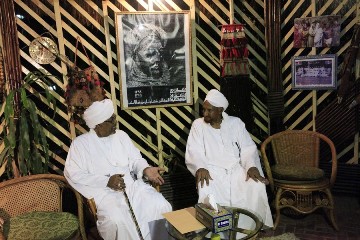Al-Mahdi slams Bashir over policies but opposes sending him to ICC
April 6, 2015 (KHARTOUM) – The head of the opposition National Umma Party (NUP) al-Sadiq al-Mahdi blasted the policies of the ruling National Congress Party (NCP) saying it led to the secession of the south and emergence of rebel movements in Darfur and underscored that the regime has failed to manage diversity.

The former Prime Minister described Bashir’s rule as “flip-flop” because it has abandoned its “ideological purity” in favor of opportunistic tactics such as signing separate bilateral accords with rebel groups to stay in power even if it meant abandoning its principles.
He also dismissed the upcoming elections and associated campaigns stressing that the NCP is using media and security machines in its favor to secure a new win.
The NUP chief said that the elections boycott by several major opposition parties will expose the regime.
Nonetheless, al-Mahdi said he opposes handing Bashir over to the International Criminal Court (ICC) because the move would lead to a greater discord because the president, who has the power and supporters, would resort to extreme violence as Syrian President Bashar al-Assad.
He reiterated his support for a South African reconciliation model that balances accountability with political stability.
Al-Mahdi noted that leader of the Popular Congress Party (PCP) Hassan al-Turabi changed his mind on surrendering Bashir to the Hague-based court from supporting it to opposing it.
Last December, al-Mahdi commented on the report presented by the ICC prosecutor Fatou Bensouda, before the United Nations Security Council (UNSC) saying it would entail political or police measures against the Sudanese government.
Bensouda told the UNSC that she will freeze her office’s Darfur investigations due to lack of UNSC follow-up and stretched resources.
Following the report, Bashir hailed Bensouda’s decision as a victory for his country and a sign of surrender by the ICC.
The NUP leader said at the time that he asked the UNSC to seek a solution which achieves either punitive justice or preventive justice, pointing that failure of the UNSC to act upon the prosecutor’s request would mean failure to achieve justice and abandonment of international responsibility
On the state of the NUP under his leadership since 1968, saying the party suffered during totalitarian rules which he said accounted for 85% Sudan’s history since independence.
He said that he enjoys great popularity because he is a philosopher and an activist, but he still works within the party’s institutions and stressed that his party does not suffer from leadership crisis noting that there are 16 leading figures managing the party affairs.
He also strongly denied the existence of a dispute between him and the previous secretary general Ibrahim al-Amin who was sacked by the NUP Central Commission last year and former vice chairman Adam Musa Madibo, pointing out that the problem of the two men is with the party’s institutions and that he enjoys a good personal relationships with them.
Since the signing of Paris Declaration last August with the rebel Sudanese Revolutionary Front (SRF), al-Mahdi has remained abroad based in the Egyptian capital of Cairo.
The Sudanese president announced that al-Mahdi can only come back to Sudan after having renounced the Paris Declaration, emphasising that Paris Declaration makes him complicit in the rebel project to bring down the regime by the force of arms.
(ST)
